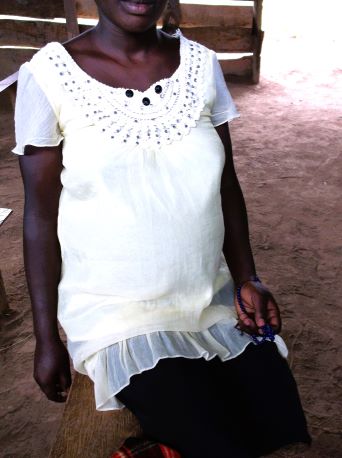
The heavy toll of teenage pregnancy: struggles and solutions
BY MOLLY KAMAKUNE
At just 14, Martha found herself thrust into the overwhelming world of motherhood. Her dreams of becoming a lawyer nurtured with passion and a deep desire to help her single mother find justice, were suddenly eclipsed by the cries of her newborn.
Living in Kaihokwa Village, Busoro Parish, Burahya, Kabarole District, Mary faced not only the physical and emotional challenges of teenage motherhood but also the harsh societal stigma that accompanied it. As sleepless nights and endless responsibilities took over her life, her aspirations seemed to fade further into the distance.
“In my Primary Seven vacation, I started working with my mother to serve food in the market. I had this special customer who would give me tips after serving him and sometimes extra money, asking me to keep the change. This continued, and even if I didn’t serve him food, he would still give me money,” Mary recalled.
After joining secondary school, their friendship continued. One day, he paid her school fees, and it was on that same day they slept together, resulting in her pregnancy before he disappeared.
Fallout and emotional turmoil
“When my mother became suspicious of me, I called him and told him I might be pregnant. This man disappeared, stopped coming to our hotel, and his phone went off. My close relationship with my mother deteriorated, and she began to abuse me all the time,” Mary recounted.
Giving birth was not easy for Mary. It was difficult to manage her pregnancy and delivery, which was through a cesarean section. From the day she gave birth, she had not healed from the wound.
“Since the day I gave birth, I’ve had sleepless nights full of tears with my baby. I did not prepare for this. The baby keeps crying, and sometimes I join the baby and we both cry with the pain in my abdomen from the C-section,” Mary said.
She added, “I feel traumatized to see my future in ruins. I see myself becoming a single mother at the early age of 15 years. I don’t have money to look after myself, and my mother told me she has no money to take me back to school. The man is nowhere to be seen to marry me,”
Teenage pregnancy in Fort Portal
Mary’s problems mirror those of hundreds of other young girls facing the same challenges due to teenage pregnancy. Currently, the teenage pregnancy rate in Fort Portal City stands at 15% among girls aged 15-19, according to data from first antenatal care visits.
Expert insights on teenage pregnancy
Ms Margrete Rukindo, a nurse and a Village Health Team (VHT) in Fort Portal, said “Teenage pregnancy is a major concern for us. Even though the government considers adulthood to begin at 18, in terms of health, an 18-year-old girl is not mature enough to bear another person in her body. We have observed that girls begin their menstrual cycles as early as 9 years old. Whenever a girl starts menstruating, she is at risk of becoming pregnant if she engages in sexual activity. We’ve seen pregnancies in girls as young as 10 to 19 years old,” she said.
Ms Rukindo advises young girls to seek medical advice before becoming sexually active and to learn about sexual health and if they become pregnant, they need to seek medical attention promptly.
She said there is a need for comprehensive sex education in schools, hospitals, villages, and homes to help curb the increasing cases of teenage pregnancies.
Healthcare support for teenage mothers
Dr. Joseph Kato, the medical administrator for Holy Family Virika Hospital, stated that out of ten teenage mothers, at least nine deliver via cesarean section. This is because most of their bodies are not fully developed to support natural childbirth, which is quite expensive.
“For the needy mothers, through our ‘Program for the Needy,’ funded by a generous friend, we cover 50% of the bill to relieve the burden on the caretakers. Most of these girls are accompanied by their grandmothers, who often do not even know the men who impregnated their grandchildren,” Dr. Kato explained.
Addressing the underlying causes
Ms Catherine Kobugabe, the Kabarole District Health Educator, said that in Kabarole district alone, from July 2023 to May 2024, out of 7,305 women attending their first antenatal visit, 1,559 were teenage mothers aged 15-19 years.
She said teenage girls who become pregnant often have inadequate nutrition, leading to stunted growth in their offspring and inadequate prenatal care during teenage pregnancies results in smaller, underweight babies.
She also noted that hormonal changes during teenage pregnancies might affect fetal growth and development and attributed the high number of teenage pregnancies to poverty, lack of education, and social inequality.
“Breaking the cycle of teenage pregnancies requires addressing these interconnected factors through comprehensive sex education in schools, hospitals, and all communities. We call upon teachers, Village Health Teams (VHTs), parents, and medical workers to work hand in hand in the fight against teenage pregnancies,” She said.


